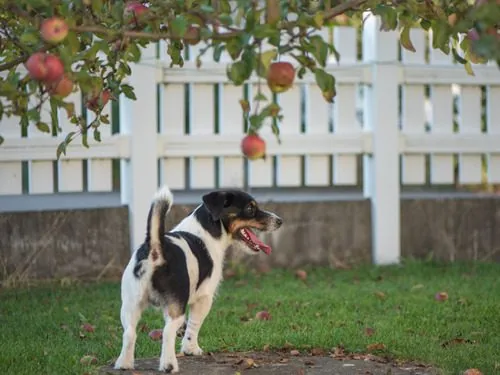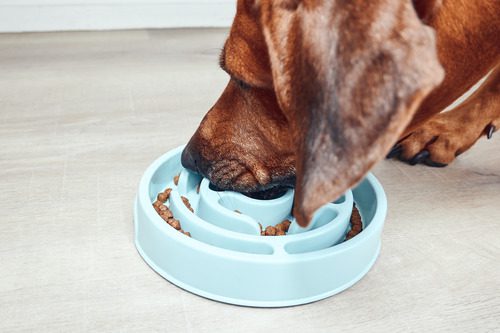Can Dogs Eat Apples?
Introducing new foods to your dog’s diet can be a tricky task, especially when trying to determine what’s safe and what’s not. One question many pet owners have is, “Can dogs eat apples?” At Brown Veterinary Hospital in Terre Haute, IN, we’re here to provide you with all the information you need to make informed decisions about your dog’s diet. This blog will explore whether apples are safe for dogs, the benefits and potential risks, and how to properly prepare apples for your canine companion. If you have any concerns about your pet’s diet, please call us at 812-645-0715 or book an appointment online.

Are Apples Safe for Dogs?
Nutritional Benefits of Apples for Dogs
Apples can be a healthy and tasty treat for your dog. They are packed with essential nutrients that can contribute to your dog’s overall well-being. Apples are rich in vitamins A and C, which are important for maintaining healthy skin and a strong immune system. Additionally, apples contain dietary fiber, which aids in digestion and can help keep your dog’s gastrointestinal tract healthy. They are also low in fat and calories, making them an excellent snack option for dogs who need to watch their weight.
Potential Risks of Feeding Apples to Dogs
While apples are generally safe for dogs, there are some potential risks to be aware of:
- The seeds and core of an apple contain cyanogenic glycosides, which can release cyanide when ingested. Although the amount of cyanide in apple seeds is typically small, it’s best to remove the seeds and core before giving apples to your dog to prevent any potential harm.
- Additionally, some dogs may have allergies to apples, which can cause symptoms such as itching, swelling, or gastrointestinal upset. If you notice any adverse reactions after feeding your dog apples, stop giving them the fruit and consult your veterinarian.
How to Properly Prepare Apples for Dogs
To safely feed apples to your dog, it’s important to follow a few simple steps. First, wash the apple thoroughly to remove any pesticides or chemicals that may be present on the skin. Next, slice the apple into small, manageable pieces, removing the seeds and core. You can choose to peel the apple, but leaving the skin on can provide additional fiber. Start by giving your dog a small piece of apple to see how they react, and gradually increase the amount if they seem to enjoy it and have no adverse reactions.
Health Benefits of Apples for Dogs
- Improved Digestion: Apples are high in dietary fiber, which can benefit your dog’s digestive health. Fiber helps regulate bowel movements and can prevent constipation. It also supports the growth of healthy gut bacteria, which plays a crucial role in digestion and overall health. Including small amounts of apple in your dog’s diet can contribute to a healthier digestive system.
- Dental Health: Chewing on apple slices can help clean your dog’s teeth and freshen their breath. The natural crunch of apples can act as a gentle abrasive, helping to remove plaque and tartar buildup. While apples should not replace regular dental care, they can be a beneficial addition to your dog’s oral hygiene routine.
- Weight Management: For dogs that need to lose or maintain their weight, apples can be a great low-calorie snack. They provide a sweet and satisfying treat without the added fats and sugars found in many commercial dog treats. When given in moderation, apples can help your dog feel full and satisfied without contributing to weight gain.
Potential Issues with Feeding Apples to Dogs
Choking Hazard
One of the primary concerns when feeding apples to dogs is the risk of choking. Large pieces of apple or whole apples can be a choking hazard, especially for smaller dogs. Always cut apples into appropriate-sized pieces for your dog and supervise them while they eat to prevent choking incidents.
Allergic Reactions
As with any new food, there is a possibility that your dog may be allergic to apples. Symptoms of an allergic reaction can include itching, swelling, hives, and gastrointestinal upset. If you notice any of these symptoms after feeding your dog apples, discontinue use and consult your veterinarian.
Sugar Content
While apples are a healthy snack, they do contain natural sugars. For dogs with diabetes or those prone to weight gain, it’s important to monitor their intake of sugary foods. Feeding apples in moderation is key to ensuring your dog reaps the benefits without any negative effects.
How to Incorporate Apples into Your Dog’s Diet
- As a Treat: One of the simplest ways to give apples to your dog is as a treat. Cut the apple into small pieces and offer them to your dog as a reward during training or as a snack between meals. This is a healthy and low-calorie way to reward your dog without resorting to processed treats.
- Mixed with Regular Food: You can also mix small pieces of apple into your dog’s regular food. This can add variety to their diet and provide additional nutrients. Start with a small amount to see how your dog reacts and gradually increase the quantity if they enjoy it.
- Homemade Dog Treat Recipes: There are many homemade dog treat recipes that incorporate apples. These can be a fun and healthy way to include apples in your dog’s diet. For example, you can make apple and peanut butter dog treats by mixing unsweetened applesauce with peanut butter and oats. Always ensure that the ingredients used are safe for dogs and consult your veterinarian if you have any concerns.
Promoting Your Dog’s Health with Safe Treats
Apples can be a safe and nutritious treat for dogs when prepared and fed correctly. They offer numerous health benefits, including improved digestion, dental health, and weight management. However, it’s important to be aware of potential risks such as choking hazards, allergic reactions, and the sugar content in apples. By following the proper preparation methods and feeding apples in moderation, you can provide your dog with a tasty and healthy snack. If you have any questions or concerns about your dog’s diet, please call Brown Veterinary Hospital in Terre Haute, IN, at 812-645-0715 or book an appointment online.
Recent Posts
About Brown Veterinary Hospital
We are here to serve as your partner in keeping your four-legged family member healthy, ensuring you have all the tools you need to provide them with a lifetime of outstanding care. Our animal hospital in Terre Haute offers a full range of services to nurture and extend your pet’s life, from wellness and preventative care to critical care, exotic pet care, and dermatology.





